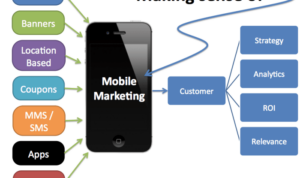Using Social Media for Brand Building sets the stage for this enthralling narrative, offering readers a glimpse into a story that is rich in detail with american high school hip style and brimming with originality from the outset.
In today’s digital age, social media has become a powerhouse for brands looking to establish their presence and connect with their audience in a more meaningful way. From creating engaging content to leveraging influencer partnerships, the strategies for effective brand building on social media are vast and impactful. Let’s dive into the world of brand building through social media and discover how you can take your brand to the next level.
Importance of Social Media for Brand Building
Social media plays a vital role in brand building by providing a platform for companies to connect with their target audience on a more personal level. It allows brands to showcase their personality, values, and unique selling points in a creative and engaging way.
Successful Brands Leveraging Social Media
- Apple: Apple has successfully used social media platforms like Instagram and Twitter to create buzz around new product launches and engage with their loyal fan base.
- Nike: Nike’s powerful presence on social media, especially on platforms like Facebook and YouTube, has allowed them to connect with athletes and sports enthusiasts worldwide, reinforcing their brand image as a leader in athletic apparel.
- Starbucks: Starbucks has effectively used social media to promote new products, run interactive campaigns, and gather feedback from customers, enhancing brand loyalty and customer engagement.
Benefits of Using Social Media for Brand Awareness and Engagement, Using Social Media for Brand Building
- Increased Brand Visibility: Social media platforms have a massive user base, allowing brands to reach a wide audience and increase brand awareness.
- Enhanced Customer Engagement: Brands can interact with customers in real-time, respond to queries, and gather feedback, leading to improved customer satisfaction and loyalty.
- Cost-Effective Marketing: Compared to traditional advertising channels, social media marketing is more affordable and offers a higher return on investment, making it a cost-effective way to promote brands.
Strategies for Effective Brand Building on Social Media

In order to create a strong brand presence on social media, it is essential to implement key strategies that will help your brand stand out in the digital landscape. This involves focusing on content creation, engagement with your audience, and maintaining consistency in your brand messaging across different social media platforms.
Role of Content Creation
Content creation plays a crucial role in brand building on social media. By producing high-quality, engaging content that resonates with your target audience, you can effectively communicate your brand’s message and values. This can include a mix of visual content, such as images and videos, as well as written content like blog posts and captions.
Importance of Engagement
Engagement is key to building a loyal following on social media. Responding to comments, messages, and mentions from your audience shows that you value their input and fosters a sense of community around your brand. Encouraging user-generated content and running interactive campaigns can also boost engagement and help spread brand awareness.
Consistency in Brand Messaging
Consistency is vital when it comes to brand building on social media. Ensure that your brand’s messaging, aesthetics, and tone of voice remain consistent across all platforms to create a cohesive brand identity. This helps build trust with your audience and makes your brand more recognizable in a crowded digital space.
Tailoring Brand Messaging for Different Platforms
Each social media platform has its own unique features and audience demographics, so it’s important to tailor your brand messaging accordingly. For example, Instagram is more visual-focused, making it ideal for showcasing products, while Twitter is great for sharing real-time updates and engaging in conversations. Understanding the nuances of each platform will help you create content that resonates with users and drives engagement.
Leveraging Influencer Marketing for Brand Building: Using Social Media For Brand Building

In today’s digital age, influencer marketing has become a powerful tool for brands looking to expand their reach and connect with a wider audience. By partnering with influencers who have a strong following on social media platforms, brands can leverage their influence to promote products or services and enhance brand visibility.
Examples of Successful Influencer Collaborations
- One great example of a successful influencer collaboration is the partnership between fashion brand Revolve and various fashion influencers. These influencers, known for their style and aesthetic, created content showcasing Revolve’s clothing and accessories, leading to increased brand awareness and sales.
- Another successful collaboration is between cosmetic brand Glossier and beauty influencers. By featuring Glossier products in their makeup tutorials and reviews, these influencers helped create a buzz around the brand and attract a new audience of beauty enthusiasts.
Identifying the Right Influencers for a Brand Partnership
- When identifying the right influencers for a brand partnership, it’s important to consider factors such as the influencer’s target audience, engagement rate, and authenticity. Look for influencers whose values align with those of your brand to ensure a genuine connection with their followers.
- Utilize influencer marketing platforms and tools to analyze influencers’ reach, demographics, and content quality. This data can help you identify the best influencers to collaborate with based on your brand’s goals and target audience.
Utilizing Analytics and Data for Brand Building
Analyzing data is crucial for measuring the effectiveness of brand building efforts on social media platforms. By leveraging analytics, brands can track their performance, understand their audience better, and refine their strategies for maximum impact.
Key Metrics for Evaluating Brand Performance
- Digital Reach: Measure the number of people who see your brand’s content.
- Engagement Rate: Track likes, comments, and shares to gauge audience interaction.
- Conversion Rate: Analyze how many users take a desired action, such as making a purchase.
- Sentiment Analysis: Understand how customers feel about your brand through comments and reviews.
Tools and Techniques for Analyzing Social Media Data
- Social Media Analytics Tools: Platforms like Hootsuite, Sprout Social, and Google Analytics provide in-depth insights.
- Competitor Analysis: Compare your brand’s performance to competitors to identify areas for improvement.
- A/B Testing: Experiment with different strategies to see which one resonates best with your audience.
- ROI Calculation: Measure the return on investment to determine the effectiveness of your social media campaigns.












